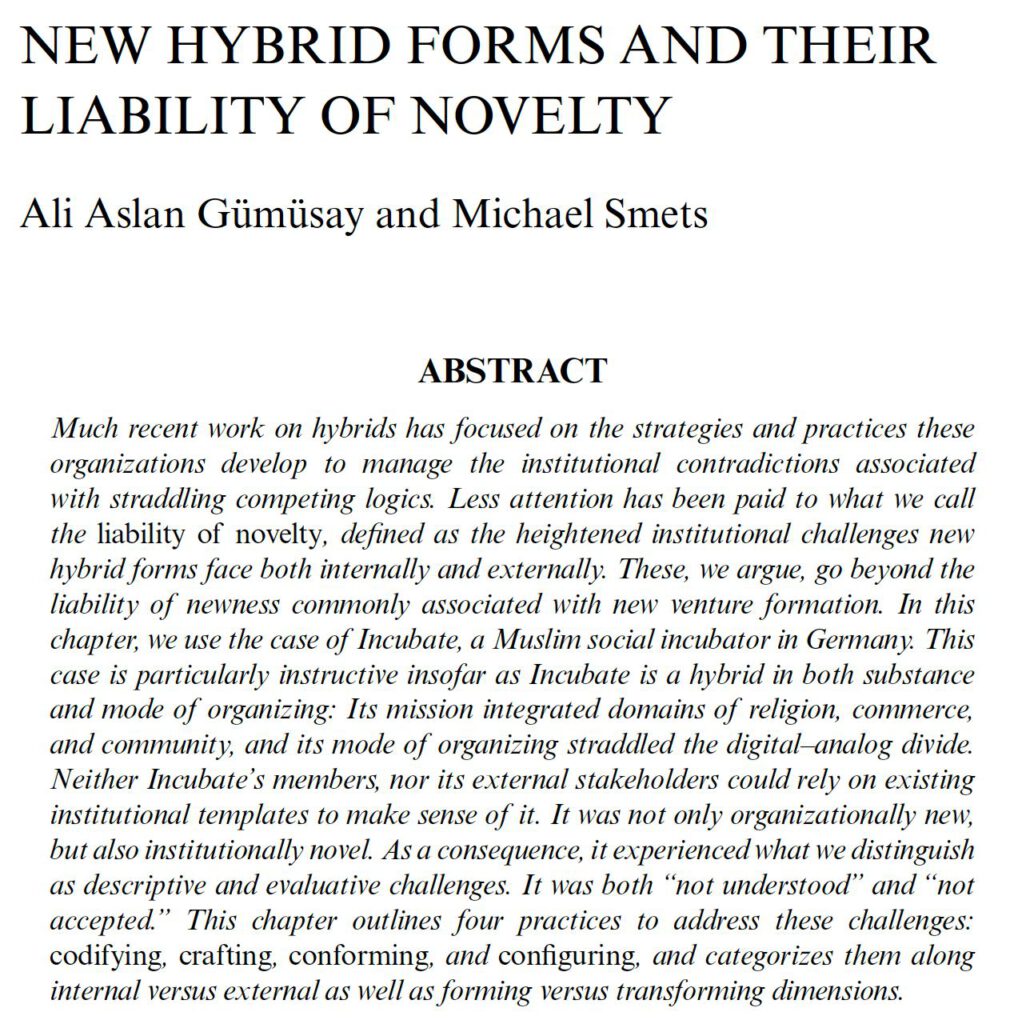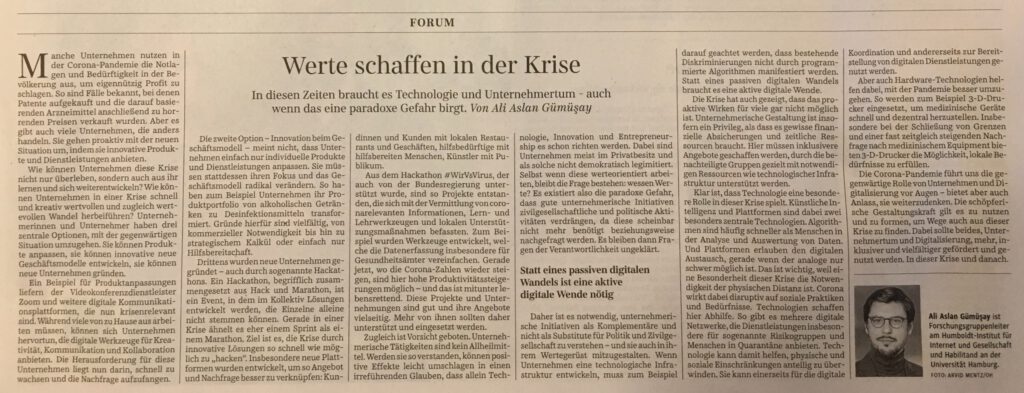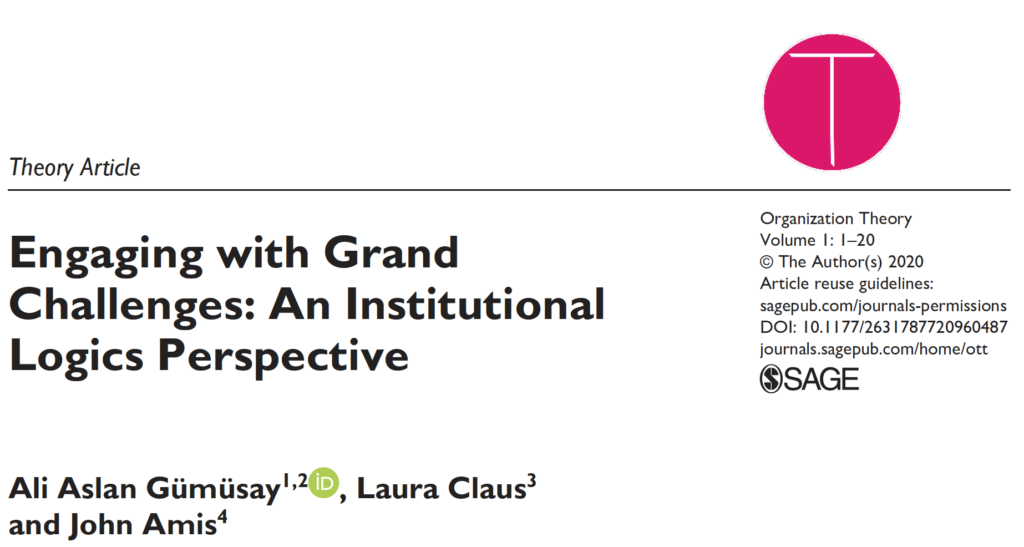Humbled to having been selected as 1 of the 10 best Junior Scientists in Germany. Thank you Jeanette Hofmann for nominating and Humboldt Institute for Internet & Society and University of Hamburg for having me.

Social entrepreneurship opens up a space for new ideas and creates opportunities to deal with conflict in innovative ways. Based on data from Afghanistan, Alina Spanuth and myself identify three ways social entrepreneurs work in conflict regions. The short piece in ![]() can be found here.
can be found here.
New co-authored article on digital social innovation and physical distancing.
Some highlights:
Abstract: As physical distancing is a core measure of containing the spread of COVID-19, this pandemic is a crisis that has uprooted social interaction. While current research mainly focuses on crises as a challenge for entrepreneurial ventures and potential regulatory response mechanisms, we complement this research by addressing the question of how crises in general—and COVID-19’s physical distancing measures in particular—shape entrepreneurial opportunities for social innovation. Based on two rounds of data collection—desktop research mapping out 95 entrepreneurial activities in Germany and four focus groups—we find first that entrepreneurs are proactive agents in alleviating the negative consequences of the COVID-19 crisis. They do so by creating two types of digital social innovation: digital brokering and digitized services. Second, we note that negative societal consequences of crises can be buffered by shifts in entrepreneurs’ strategic orientation through improvised venturing, rapid pivoting and pro-social product extension. Third, we note variance in the persistence of changes with consequences for entrepreneurial opportunities and social innovation: Whereas some social innovation are rather ephemeral, others might endure and promise long-term impacts. We offer key insights for the literature on crisis, social innovation and hybrid organizing as well as on the implications for entrepreneurship practice and policy.
Grateful to be mentioned. Even more grateful to work with wonderful colleagues on topics such as entrepreneurship, innovation, digitalization – all with a societal perspective.


In this new piece co-authored with Michael Smets, we explain that ventures may face not only a liability of newness but also a liability of novelty. The legitimacy threshold for ventures that are institutionally novel is higher than for those that are merely organizationally new. This is because they face both additional descriptive and evaluative liabilities. A new organizational form can be both “not understood” & “not accepted”.

Update: The paper has won the Emerald Literati Award 2021.

New article published in European Management Review co-authored together with John Amis. We argue that far too often is context relegated to the background in our field research and writings. Deep understanding and expertise of context is imperative for better theorizing. We present implications for theory, methodology, and community.

An article in the Süddeutsche Zeitung about technology and entrepreneurship in times of crisis can be accessed here.


We live in troubled times. For long, humanity has sustained itself from the world’s resources. Recently, however, excessive production and consumption has threatened the “planetary boundaries” that sustain our existence, resulting in catastrophes such as biodiversity loss and the current climate crisis that we are in. At the same time, populism, extremism, and the polarization of societies is on the rise and social cohesion is under threat, with digital technologies allowing orchestrated misinformation campaigns to aggravate and challenge peace, democracy and social stability. In the context of these and other major societal concerns, it is apposite to ask what is the role of institutional theory in general, and in this case institutional logics in particular, in furthering our understanding of these so-called ‘grand challenges’.
This is what Laura, John and myself try to do in this article.

Grand challenges are fundamental societal concerns, and as such affect all of us in one way or another. We believe in the explanatory power and potential of the institutional logics perspective to further contribute to our understanding of some of the most pressing issues of our time. For this, we advocate for further reflection on four analytical dimensions: macro-level positioning, contextuality, temporality, and value plurality.
First, the notion of macro-level positioning links organizing principles to macro-level orders and embeds them in the interinstitutional system. It also embraces the environment as a key concern and logic. Second, contextuality moves away from a rather Northern-centric focus and takes into account the plurality of logics and their interaction across interinstitutional systems. Third, temporality is about the consideration of changing logics and logic constellations over time. Finally, value plurality brings back attention to the value-ladenness of logics themselves and offers a means to question concepts such as ‘the market’ and the market logic.
Integrating these four dimensions, we contend, will contribute towards a transformative institutional logics perspective in the sense that they offer key implications for our engagement with grand challenges. It will further open up opportunities for institutional scholars to make substantive contributions to society’s most pressing concerns.